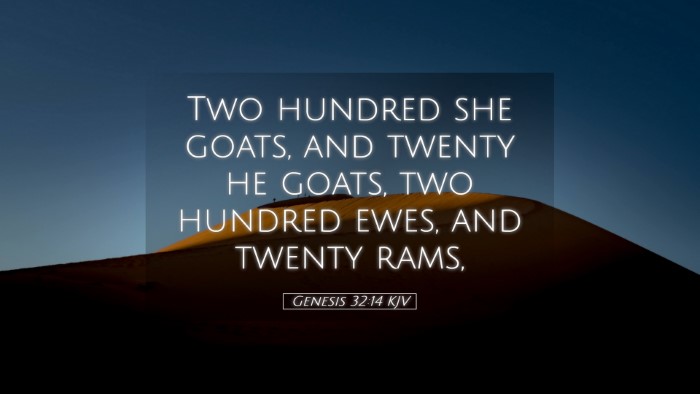Commentary on Genesis 32:14
Verse Text: "I will send to my lord; and I will offer him a present of cattle and my servants, and I will bow down before him."
Introduction
Genesis 32:14 is a profound verse that encapsulates Jacob's approach as he prepares to meet his estranged brother Esau after many years. This passage has generated extensive commentary from both early and contemporary theologians, shedding light on the themes of reconciliation, humility, and faith in divine providence.
Historical Context
The background of this verse is essential to understanding its significance. Jacob had fled from his home due to fear of Esau's wrath after the deception regarding the blessing, which he had obtained from their father Isaac. The years spent away from home were filled with both trials and divine encounters, notably his wrestling with God. Now, as Jacob returns, he is anxious about Esau's potential hostility.
Commentary Insights
1. Matthew Henry's Perspective
Matthew Henry emphasizes Jacob's recognition of his past wrongs and his need for reconciliation. He notes that Jacob’s actions of sending gifts ahead of time demonstrate his desire to pacify Esau’s anger and restore their relationship. Henry points out that the gifts are not just mere offerings but symbolize Jacob’s acknowledgment of his past misdeeds and his desire to make amends.
2. Albert Barnes' Insights
Albert Barnes highlights the significance of humility in Jacob's approach. He suggests that Jacob’s willingness to bow down before Esau is not merely a formal gesture but an expression of his sincere desire for reconciliation. Barnes also comments on the strategic nature of Jacob’s gift-giving, understanding that it could soften Esau's heart and pave the way for a peaceful reunion. This indicates a practical application of faith combined with personal initiative, reflecting a deep understanding of human relationships.
3. Adam Clarke's Exegesis
Adam Clarke provides a linguistic analysis of the Hebrew terms used in this verse, expounding on the meanings behind terms like "lord" and "present." He emphasizes the cultural significance of offerings in ancient Near Eastern societies as a means of appeasing and honoring others. Clarke's commentary sheds light on the ritualistic aspects of Jacob's actions, underscoring their importance in terms of social ethics and the restoration of familial bonds.
Thematic Analysis
1. Reconciliation and Forgiveness
This verse showcases a pivotal moment in the theme of reconciliation throughout the biblical narrative. Jacob's actions serve as a model for believers seeking to mend broken relationships. The act of sending gifts reflects a heart willing to go the extra mile for peace, portraying a necessary step in seeking forgiveness. As noted by Henry, reconciliation is not solely about words; it involves tangible expressions of goodwill.
2. Humility and Submission
Jacob's humility is paramount in his approach towards Esau. Barnes elaborates that true humility often requires one to acknowledge their past failures and take the initiative in making things right. This act of submission not only conveys respect but also disarms potential hostility. For pastors and theologians, this serves as a reminder of the importance of humility in interpersonal relationships, especially in the context of ecclesiastical disputes.
3. Faith in Divine Providence
A deeper layer of this passage is Jacob's reliance on God's providence. Though he takes practical steps to reconcile, his actions are bathed in prayer and dependence on God's intervention. Clarke’s remarks about the components of the offerings point to the understanding of God as the ultimate reconciler, reinforcing the belief that divine guidance is necessary in every effort of reconciliation.
Practical Applications
1. For Pastors
- Encourage congregants to pursue reconciliation in their own relationships.
- Model humility in leadership, demonstrating to others the importance of seeking forgiveness.
- Teach the balance of faith and action in handling conflicts.
2. For Students and Scholars
- Analyze the socio-cultural implications of Jacob’s gifts in ancient Israelite society.
- Explore the theological implications of humility in the life of believers today.
- Consider the ways in which this narrative reflects the overarching theme of redemption in the Bible.
3. For Theologians
- Examine the intersection of human action and divine sovereignty in the context of reconciliation.
- Delve into the significance of familial relationships in the overall biblical narrative.
- Discuss the implications of Jacob's character development throughout Genesis.
Conclusion
Genesis 32:14 serves as a powerful reminder of the importance of reconciliation, humility, and faith in navigating complex human relationships. The insights provided by Matthew Henry, Albert Barnes, and Adam Clarke enrich our understanding and encourage a deeper application of these biblical principles in our lives today. As we reflect on Jacob's journey, may we foster a spirit of peace and reconciliation in our communities, embodying the teachings of Scripture.


